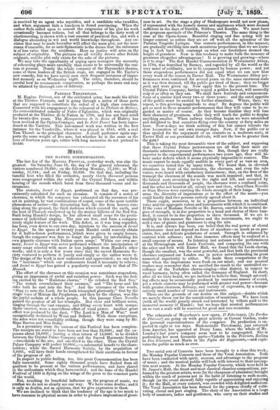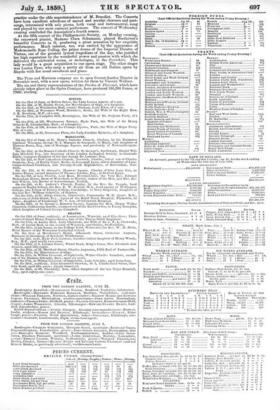Two serial sets of Concerts have been brought to a
close this week; the Monday Popular Concerts and those of the Vocal Association. Both have been conducted with spirit, success and advantage to the progress of music ; and the musical public will look with interest to their resump- tion next season. At the Monday Popular Concerts, which were held in St. James's Hall, the finest and most classical chamber compositions, per- formed by the greatest artists, were (by the cheapness of admission) brought within the reach of persons not in the habit of listening to such music, though (as the event showed) fully capable of appreciating and enjoying it ; for the Hall, at every concert, was crowded with delighted audiences. The Vocal Association has been formed for the purpose chiefly of culti- vating choral and part singing. The choir of the Association is a large body of amateurs, ladies and gentlemen, who carry on their studies and
practice under the able superintendence of M. Benedict. The Concerts have been excellent selections of sacred and secular choruses and part- songs, intermixed with solo pieces, both vocal and instrumental, sung and played by our most eminent performers. The concert of Wednesday evening concluded the Association's fourth season.
At the filth concert of the Philharmonic Society, on Monday evening, the renowned pianist, Madame Clara Schumann, played Beethoven's beautiful Concerto in G, producing a great sensation by her exquisite performance. Much interest, too, was excited by the appearance of Mademoiselle Rose Csillag, the prima donna of the Imperial Theatre of Vienna, one of the greatest Ipical tragedians of the day, who justified her high mutation by the wonderful power and passion with which she delivered the celebrated scene, or monologue, in the Freisekiite. This lady would be a great acquisition to our opera stage. The other singer was Louisa Pyne, who sang a pretty air from an old Italian opera by Haydn with her usual sweetness and grace.



























 Previous page
Previous page